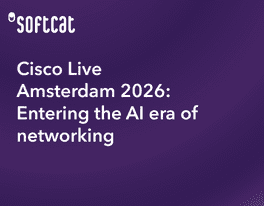
A growing number of businesses pride themselves on being people-first organisations, including here at Softcat. After all, people are a business.
But since the pandemic forced us to change how we live and work, protecting company culture and employee happiness has been one of many huge challenges facing business leaders and HR teams.
As a new dominant work model emerges – hybrid working – and collaborating both remotely and in-person becomes second nature to teams, company culture strategies must keep up.
Within a hybrid workforce, there is a risk teams and individuals can quickly become siloed off from one another, affecting the employee experience and company-wide culture.
So, to ensure your company culture continues to thrive in the age of hybrid working, here are some key considerations:
Listen to your people
Company culture is a big balancing act, making sure the needs of the business and its people are equally met. If the balance is off, employee experience will suffer, turnover will increase, and business performance will suffer.
According to a recent study, 63 percent of UK adults say their company’s culture is one of the main reasons they have stayed in their jobs. Equally, companies with poor company culture more than triple their chances of employees leaving.
At Softcat, we’ve always been a people-first organisation. We understand that positive company culture and a team of nurtured employees produce the best results for everyone involved.
But for businesses to understand the reach and impact of their company culture initiatives, they need to have their ears on the ground and keep open channels of communication. Our regular surveys and 1-to-1 phone calls encourage information and feedback to be shared – no matter where employees are working from.
Armed with this insight, leaders can better protect the employee experience as the hybrid working model matures and evolves.
Digital touchpoints
The bottom line is employees need three critical things: communication, a feeling of self-belief and empowerment in their role and strong management.
Making people feel happy and secure in their role naturally lends itself to in-person contact – something that those in the office more frequently benefit from. So, with remote and hybrid working becoming increasingly more common than 9-to-5 office life, employee engagement strategies need to be adjusted in line with new ways of working.
According to a global survey by Statista outlining remote workers’ biggest struggles, 32 percent cited difficulties with collaboration, communication and loneliness as the chief reason behind their concerns. Clearly, there’s some work to do.
Digitisation and the right communication tactics can really help spearhead employee experience improvements. Team building exercises and opening a dialogue through video, voice or text chat can go a long way.
It’s important that communication isn’t all about work either. At Softcat, one activity we’ve tried and tested throughout our regional offices is starting a “virtual watercooler” where we chat about anything and everything, helping employees connect in a more natural and meaningful way.
Employee experience starts at the top
To stand out in the jobs market and retain the best talent, businesses need to focus on the employee experience. And for company culture to thrive it needs to be instilled and fostered from the top down.
At Softcat, we believe making people feel valued at home is just about reaching out a bit more and not scrutinising those who opt to work from home more than others. We believe it’s this attitude that directly links to our excellent customer satisfaction and overall company success.
Going into the new age of hybrid working, company culture will be key to holding an organisation together by its shared values, relationships and mission.
It’s important to reaffirm your company ethos at this point. Simple messages, setting examples with transparent, top-down leadership and recognition of all your employees’ hard work will help remind everyone why they do what they do and feel part of something bigger.
Empowerment, not micro-management
As the hybrid working model matures, every employee needs to feel trusted and empowered but also supported.
Getting this balance right can be difficult, at times, and if workers feel distrusted or micro-managed, feelings of resentment and underappreciation can start to build up, affecting wider company culture.
Effective hybrid team management is something managers need to prepare for, adapt styles and policies as workers are split between the office and home and learn from any mistakes along the way.
Clear processes and targets need to be in place and communicated to employees, so they know what to do and feel confident to work as independently as possible, whether at home or in the office.
Employees also need to know that help is just at the other end of the room, phone, or messaging platform. And that their hard work and successes will be made visible among peers and recognised by leaders in the same way as they were pre-pandemic.
To find out more about bringing company culture to a hybrid or remote workforce, listen to Softcat’s Explain IT podcast on the topic here.







